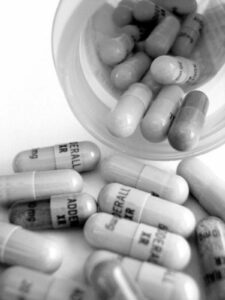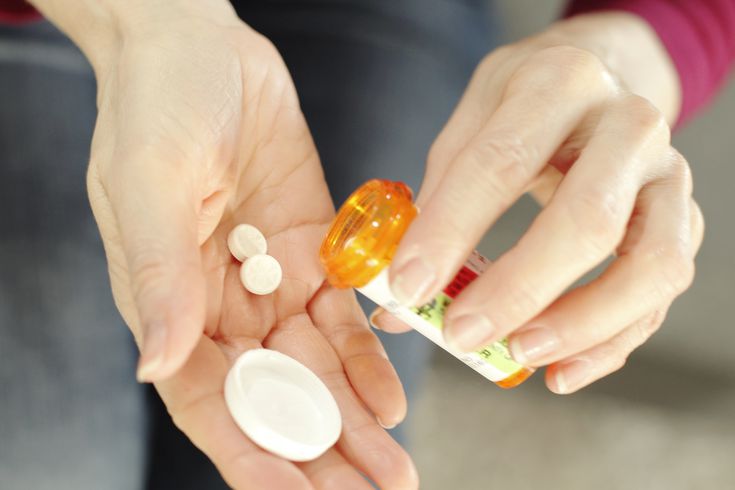Amphetamine (Adderall) is a prescription medication that is used to treat Attention Deficit Hyperactivity Disorder (ADHD). It is a stimulant that works by increasing the amount of dopamine and norepinephrine in the brain. Adderall can help people with ADHD to focus and stay on task. It is important to know all there is about Amphetamine before taking it, especially if you have any other health conditions. In this blog post, we will discuss everything you need to know about Amphetamine.
Contents
What Is Amphetamine (Addreall)?
 Amphetamine is a central nervous system (CNS) stimulant of the phenethylamine class. Amphetamine was first synthesized by German chemist Eduard Simon in 1887. And exists as two enantiomers: levoamphetamine and dextroamphetamine.
Amphetamine is a central nervous system (CNS) stimulant of the phenethylamine class. Amphetamine was first synthesized by German chemist Eduard Simon in 1887. And exists as two enantiomers: levoamphetamine and dextroamphetamine.
Amphetamine properly refers to a specific chemical, the racemic-free base. Which are equal parts of the two enantiomers, levoamphetamine, and dextroamphetamine, in their pure amine forms. The term amphetamine is frequently used informally to refer to any combination of the enantiomers.
Moreover, the term amphetamine is sometimes used informally to refer to other substituted amphetamines. Such as methylenedioxymethamphetamine (MDMA).
How Does Amphetamine Work?
The way of working amphetamine is not very complicated or different from how other drugs work. It is a central nervous system stimulant that works by affecting the levels of certain chemicals in the brain.
These chemicals are known as neurotransmitters, and they help to regulate mood and focus. Amphetamines increase the activity of some neurotransmitters. While at the same time blocking the reuptake of others. This action results in more dopamine and norepinephrine being available in the brain. This increased level results in improved mental focus and concentration.
It has been used for many years to treat conditions such as ADHD and narcolepsy. They are also sometimes used to treat depression, although their use for this purpose is controversial due to the potential for abuse and addiction.
Amphetamine is a Schedule II Controlled Substance, which means that it has a high potential for abuse and addiction. When abused, amphetamines can lead to feelings of euphoria, increased alertness, and improved focus.
Dosage Information
It is important to follow the dosage information provided by your doctor. However, here are some recommended doses, such as;
- The recommended starting dose for adults with ADHD is 20 mg per day. The dose may be increased by your doctor, depending on your response to the medication.
- Amphetamine (Adderall) should be taken at the same time each day, preferably in the morning.
- It can be taken with or without food. If you miss a dose, take it as soon as possible and then go back to taking it at your regular interval.
- Do not take two doses at once unless otherwise directed by your doctor.
It is necessary to follow the instructions given by your doctor or pharmacist. Amphetamine (Adderall) may be habit-forming, and this medicine is a drug of abuse. Tell your doctor if you have had problems with drug or alcohol abuse.
Also, keep this medication in a safe place to prevent theft, misuse, or abuse. If someone accidentally swallows this drug, get medical help right away.
How Does It Help In Recovery?
 There are a number of ways in which amphetamine (Adderall) can help with recovery. Some of the famous ones are:
There are a number of ways in which amphetamine (Adderall) can help with recovery. Some of the famous ones are:
- Amphetamine (Adderall) helps people to focus and concentrate. This is especially helpful for those who are trying to stay away from drugs or alcohol. As they can use this medication to help them focus on their goals and stay away from temptation.
- It also provides a sense of energy and well-being, which can be helpful in early recovery. When people are dealing with the fatigue and low motivation.
- Amphetamine (Adderall) can also help to reduce cravings for substances of abuse, which can make it easier to stick to a recovery program.
These are the main ways in which amphetamine (Adderall) can help with addiction recovery. Moreover, it is always important to consult with a physician or addiction specialist to see if this medication is right for you.
There have been various studies conducted on the efficacy of amphetamine (Adderall) in addiction recovery. And the results have been mixed. Some people do experience success while taking this medication, while others do not. It is important to work with a professional to figure out if amphetamine (Adderall) is right for you.
Side Effects Of Amphetamine
It is quite possible to have some side effects when it has benefits, as every coin has two sides. Hence, some common side effects include:
- Anxiety
- Restlessness
- Insomnia
- Headache
- Dizziness
- Nausea
Serious side effects are rare, but they can occur. These include:
- Aggressive behavior
- Hallucinations
- Paranoia
- Seizures
If you experience any of these serious side effects, stop taking the medication and call your doctor right away. Amphetamine can also be addictive, so it’s important to take it only as prescribed by your doctor.
Misuse or abuse of amphetamines can lead to serious heart problems, mental health problems, or even death. So, it is essential to be aware of the potential risks before taking this medication.
If you have any questions about amphetamine, be sure to ask your doctor or pharmacist. They can help you understand the risks and benefits of this medication.
Risks In Sudden Withdrawal
 Many studies have shown that people who suddenly stop taking amphetamines may experience very serious side effects, including Depression, Fatigue, Insomnia, Irritability, Lethargy, Muscle aches, Paranoia, Restlessness.
Many studies have shown that people who suddenly stop taking amphetamines may experience very serious side effects, including Depression, Fatigue, Insomnia, Irritability, Lethargy, Muscle aches, Paranoia, Restlessness.
In some cases, people who have stopped taking amphetamines may also experience more serious side effects, such as psychosis. Thus, there are risks in sudden withdrawal from amphetamines.
If you are on medication, you have to be very careful before you make any changes. It is always best to speak with a doctor first. A sudden withdrawal from amphetamines can be dangerous.
Things To Avoid While Taking Amphetamine
There are certain things you should avoid while taking amphetamine. These include:
- Alcohol
- Caffeine
- Nicotine
- Caffeine
- Sugar
- Nicotine
- Illegal drugs
Alcohol can increase the side effects of amphetamine and make it more difficult to control your impulses. Caffeine can make you more jittery and increase your heart rate. Sugar can give you a quick boost of energy, but it will eventually make you crash harder. Nicotine can interact with the medications in amphetamine and make them less effective.
These are some basic things to avoid while taking amphetamine. If you have any questions, be sure to ask your doctor or pharmacist. Amphetamines are a class of psychoactive drugs that includes the likes of Adderall, Ritalin, and Dexedrine. Therefore, it may interact with other substances that also affect the brain, such as alcohol. So it’s important to know what not to mix with Adderall before taking it.
Alternatives to Amphetamine
 There are a few alternatives to consider if amphetamine doesn’t work. Some of the options are;
There are a few alternatives to consider if amphetamine doesn’t work. Some of the options are;
Medication
When amphetamine is not an option, there are other medications that can be used to help with the disorder. These include;
- Strattera (atomoxetine)
- Intuniv (guanfacine)
- Tenex (guanfacine)
- Catapres (clonidine)
- Kapvay (clonidine)
- Vyvanse
- Ritalin
It is important to discuss all potential options with a doctor before making any decisions. The best course of action will vary from person to person.
Therapy
Therapy is the most common form of treatment for the disorders. The goal of therapy is to improve how to better cope with the symptoms. The types of therapies are;
- Cognitive-behavioral therapy
- Interpersonal therapy
- Family therapy
- Psychodynamic therapy
While medication may be the first step for some, it is important to consider all options before making a decision. Each person is different and will require a unique course of treatment. Work with a doctor to find what will work best for you or your child.
Self-Care Techniques
Medication and therapy are not the only options available, self-care techniques are also useful. Such as;
- Exercise
- Diet
- Sleep
- Stress management
- Organization
There are many different ways to approach self-care. But, what works for one person may not work for another. Therefore, it is important to find what works best for you and stick with it. Make sure to consult with a doctor before making any major changes to diet or exercise routines.
However, do not forget to consult with a doctor before making any decisions. As amphetamine should not be the only focus when seeking treatment. There are many other options available that can be just as effective.
Conclusion
To conclude, it is considered a powerful medication in order to use to improve productivity and focus. It is important to be aware of the potential side effects and risks associated with its use. If you are considering using amphetamine, be sure to talk to your doctor first to see if it is right for you.
If you or someone you know is struggling with addiction, please reach out for help. There are many resources available to those who need assistance. Thank you for reading!
A Word From Therapy Mantra
Your mental health — Your psychological, emotional, and social well-being — has an impact on every aspect of your life. Positive mental health essentially allows you to effectively deal with life’s everyday challenges.
At TherapyMantra, we have a team of therapists who provide affordable online therapy to assist you with issues such as depression, anxiety, stress, workplace Issues, addiction, relationship, OCD, LGBTQ, and PTSD. You can book a free therapy or download our free Android or iOS app.


